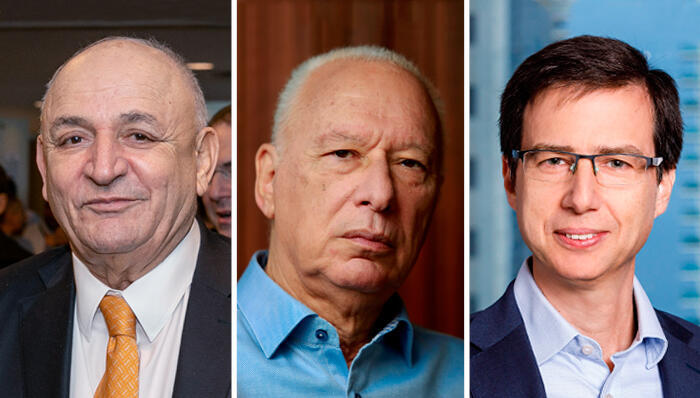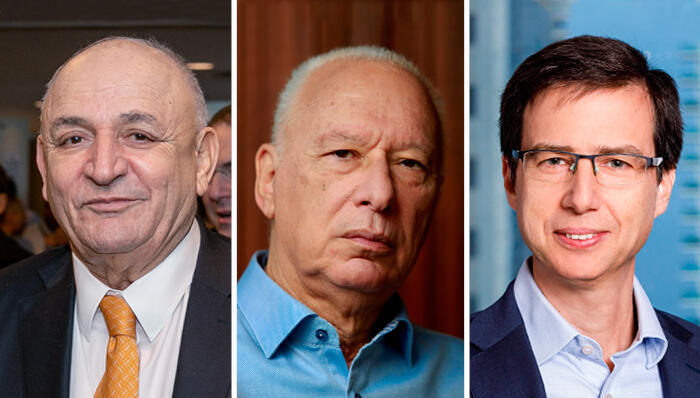
Israeli companies are buying back their shares—but are they following through?
Despite numerous buyback announcements, there’s a significant gap between declared intentions and actual purchases. What’s holding companies back?
When the cannons roar, stock markets tremble. But in Israel, it’s not just cannons that shake the markets. The attempted judicial overhaul also led to the Tel Aviv Stock Exchange significantly underperforming compared to global markets, and before that, the coronavirus pandemic rattled it.
One strategy companies use to navigate market turbulence, reassure investors, and demonstrate confidence in their stock is through share buybacks or at least by announcing intentions for such programs. Since 2023, 74 companies have unveiled 89 share buyback initiatives, with a cumulative value of NIS 4.9 billion (approximately $1.3 billion).
Nevertheless, there’s a marked disparity between announcements and executions. To date, the actual volume of repurchases amounts to NIS 2 billion ($530 million), representing just 40% of the originally declared intentions.
The majority of these programs were announced in 2023. During that year, 46 companies declared 59 buyback plans totaling NIS 2.4 billion. In practice, after 85% of these programs have already expired, shares worth NIS 1.36 billion were repurchased, representing 57% of the maximum declared amount. One program was canceled a few months after its launch without the company buying a single share. Additionally, seven programs, four of which have already expired, saw no purchases at all.
For 18 additional buyback programs, with a declared aggregate purchase target of NIS 618 million—17 of which have already concluded—the execution rate fell short of 50%. In these initiatives, companies acquired shares valued at just NIS 213 million.
In contrast, at the upper end of the spectrum are 15 programs with a cumulative value of NIS 392 million that were executed at 98% or higher. These data were compiled for Calcalist by Hadar Romano, the Data Products Manager at the Tel Aviv Stock Exchange.
Eighty-six percent of the programs (51) were launched following negative returns on the company’s stock in the year preceding their initiation, with 37 cases—63% of the programs—experiencing a decline of 20% or more. Several sources who spoke with Calcalist emphasized the connection between what they perceived as a low stock price and the company’s intention to execute a share buyback.
Twenty-two of the programs, representing 37% of the total, were announced for buyback amounts less than NIS 10 million, with 17 of these for amounts under NIS 4 million. Only five programs, or 8%, were declared for amounts of NIS 100 million or more. The largest, announced by Bank Leumi for up to NIS 800 million, concluded with 75% of the declared amount executed. This was due to restrictions imposed by the Bank of Israel on continued buybacks in light of the war.
So far in 2024, 28 companies have announced 30 share buyback programs totaling NIS 2.5 billion. Of these, purchases amounting to NIS 682 million have been executed, representing 27% of the maximum declared amount. However, apart from two programs that have already expired, the others remain active, potentially allowing for additional purchases within their frameworks.
In 2024, Bank Leumi was again responsible for the most extensive program, setting the maximum purchase amount at NIS 1 billion, to be acquired gradually over four phases. The bank has so far executed most of the first phase, 23% of the total amount. Other large-scale programs launched in the past two years include Airport City, which bought shares worth NIS 100 million and expanded the program to NIS 430 million; Isras, with a NIS 300 million program; and Delek Group, with NIS 200 million. Among other notable companies were Harel, Phoenix, G City, Mivne Group, Luzon Group, Danya Cebus, and its parent company, Lapidoth Capital.
The strategy: fewer tradable shares, higher value
A share buyback program is an initiative undertaken by a company to repurchase its own shares from private investors. The program pre-defines various conditions for its implementation, including the maximum execution amount and end date, and is approved by the company’s audit committee and board of directors.
Most programs launched in 2023 and 2024 were initially defined to run for several months to a year, though some were set for longer durations. The repurchased shares become dormant and are not factored into the company’s valuation or share value calculations, nor do they entitle their owner—the company—to dividends. As a result, this process leads to a reduction in the number of freely tradable shares, potentially increasing the value of the remaining shares.
Ilan Paz, CEO of Barclays Israel, explained to Calcalist the reasons behind companies launching buyback programs: “Investors view negatively companies that have accumulated substantial cash without a plan for investment or distribution. The two primary methods for distributing accumulated capital are through dividend payments or share buyback programs.”
Paz noted, “Unlike dividends, which investors expect regularly and whose reduction or cessation can signal trouble and deter dividend-focused funds, buyback programs offer companies more flexibility. They don’t create expectations of consistency beyond the company’s published repurchase declarations.”
Paz highlighted an additional advantage: “Share buybacks are perceived as a vote of confidence by company management in future growth and increased company value.” Considering the investors’ perspective, Paz added, “Buybacks also offer investors flexibility, allowing them to choose whether to accept the repurchase offer and gain liquidity, or to continue holding their shares.”
However, there are critical voices on Wall Street regarding these moves, arguing that the reduction in the number of shares increases earnings per share, thus allowing CEOs to more easily meet their bonus-related targets.
Addressing the frequency of this practice among Israeli companies, Paz explained, “Unlike banks and telecommunications companies, which are adept at distributing dividends and executing share buybacks, other Israeli companies tend to accumulate substantial cash reserves. In the Israeli context, it’s possible that due to our history of crises, CEOs sleep better at night when the cash coffers are very full.”
Furthermore, Paz noted that company management, especially in the technology sector, prefers to retain cash for potential acquisitions. However, they are often cautious in actually executing these acquisitions, resulting in the accumulation of cash without utilizing it for distribution.
“Boosts stock performance and improves profit ratio”
A senior executive at one of the companies that initiated a share buyback program explained the gap between announced plans and actual implementation: “Companies announce these programs not necessarily to start immediately, but to have a future tool at their disposal. Share repurchasing is a process that requires approvals from the audit committee and the board of directors. Therefore, management teams prefer to secure such approval in advance, allowing them to capitalize on market opportunities later. This is also why they tend to approve a relatively broad framework upfront,” he explained. “As time passes, the company’s needs may change. Given the market uncertainties, management might prefer not to utilize the full approved framework.”
The CEO of another company that initiated share buyback programs added that their move was intended for several purposes, including “purchasing an asset (the company’s stock) that we know well and trust, which is currently undervalued, as the stock is trading at a discount to its equity, making it beneficial for the company. Additionally, the buyback boosts stock performance and improves the profit ratio, which is good for investors. The fact is that the market appreciated our move, and we received positive feedback on it.”
When asked about the relatively low volume of share buyback programs by Israeli companies, he noted, “This is a relatively innovative instrument for the local market. It’s an advanced financial move, which is why some management teams are hesitant about it.”
Addressing the gap between declared program volumes and actual implementation, the CEO explained, “When defining the program, we set in advance the maximum amount we’re willing to invest, as well as the maximum share price at which we’d want to repurchase shares. Sometimes, due to an improvement in the company’s situation or changes in market conditions, the share price reaches the maximum threshold before the full pre-defined amount is utilized.”
There are additional reasons why buyback programs may not be fully executed. For instance, shareholders might be unwilling to sell their shares back to the company. This is particularly likely when a program is launched following a decline in share price. If the company views the current share price as attractive, investors may share this perspective and prefer to wait for the stock to rise before selling. Sometimes, the program’s scope doesn’t allow large players to liquidate their positions, resulting in a low response to buyback offers. Occasionally, companies use buyback programs as a PR tool, finding it sufficient to merely announce the program’s existence to signal confidence to the market.
Another CEO who spoke with Calcalist summed up that share buybacks are “good for the company, good for the stock, good for investors.” He explained that “Unlike dividends, which come out of the company’s resources and reduce its equity, buybacks don’t have this effect.”
The CEO further noted, “I’m buying the stock when its price is low, thus maximizing value for the investors who hold it.” He added that through a buyback program, “I can remove ‘weak hands’ from the game—those investors holding small amounts of shares—and retain the institutional investors who maintain long-term holdings in the company.” Additionally, he explained, “Later, if I want to allocate more shares to institutional investors, I can use the shares acquired through the buyback program. This way, the dilution imposed on shareholders will be lower than if we hadn’t implemented this strategy.”















